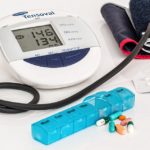by Michelle Sutton-Kerchner
As summer’s heat approaches, follow these safety tips to protect your heart …
If only there was sunscreen for the heart. Summer weather puts a strain on this tireless organ and muscle, regardless of health status or age. Here are tips from the American Heart Association to help keep your heart cool and calm this summer (unless you’re into rollercoasters and water skiing, which definitely affects the “calm”).
- Hydrate. Drink plenty of water before, during, and after outdoor activities. If exercising, increase your intake or consider a sports beverage to replenish lost electrolytes. Avoid caffeine and alcohol, which dehydrate your system and can affect heart rhythm.
- Dress appropriately.
 Wear light-colored, lightweight cotton clothing. If possible, purchase sportswear made with sweat-wicking fabrics. Some even offer sun protection with built-in sunscreen. Consider wrapping a dampened bandana or similar scarf around your neck, a central cooling point on the body. Wear well-ventilated shoes to limit heat build-up. Replace your baseball hat with a sun-visor hat, which shades face and eyes while still allowing heat to escape.
Wear light-colored, lightweight cotton clothing. If possible, purchase sportswear made with sweat-wicking fabrics. Some even offer sun protection with built-in sunscreen. Consider wrapping a dampened bandana or similar scarf around your neck, a central cooling point on the body. Wear well-ventilated shoes to limit heat build-up. Replace your baseball hat with a sun-visor hat, which shades face and eyes while still allowing heat to escape. - Take frequent breaks. Outdoor activity is not your treadmill or climber routine. The workout you accomplish in the climate-controlled Center reduces strain on organs, especially the heart, by eliminating the influence of heat and humidity. Simple physical tasks done at the peak of heat can be a challenge. This is not a sign of a slacker. Find a shaded area for rest and hydration.
 Grab a buddy. Whether gardening or going for a run, a companion can be helpful if you start to become affected by the heat. Avoid outdoor excursions between noon and 3:00pm when the sun is strongest and the temperatures are riskiest.
Grab a buddy. Whether gardening or going for a run, a companion can be helpful if you start to become affected by the heat. Avoid outdoor excursions between noon and 3:00pm when the sun is strongest and the temperatures are riskiest. Mind your meds. Some heart medications can exaggerate the body’s response to heat. Ask your physician if your medication puts you at greater risk for heat-related illnesses.
Mind your meds. Some heart medications can exaggerate the body’s response to heat. Ask your physician if your medication puts you at greater risk for heat-related illnesses.- Consider your age. Young children and older adults should take special precautions in the heat, regardless of heart condition. These age groups cannot regulate body temperature as effectively. Dehydration also may go unnoticed more easily.
- Know the signs of heat illness: Pay attention to warnings that indicate your body has tolerated too much heat. These include headache, dizziness, light-headedness, weakness, and nausea. If ignored, symptoms can worsen and lead to heat stroke, which requires serious medical attention.
 Getting outside in nice weather can be refreshing and healthy. With some precautions, you can safely enjoy warm sunshine. When you don’t feel like coating yourself in sunscreen and sweating beyond your workout’s own efforts, chill out in the Center. Here, you’ll only sweat what you earn. We’ll even let you sport your shades.
Getting outside in nice weather can be refreshing and healthy. With some precautions, you can safely enjoy warm sunshine. When you don’t feel like coating yourself in sunscreen and sweating beyond your workout’s own efforts, chill out in the Center. Here, you’ll only sweat what you earn. We’ll even let you sport your shades.
Sources
“Protect Your Heart in the Heat,” American Heart Association at heart.org.
Image Credits
Fountain with bird: pixabay.com/en/bird-drop-of-water-fountain-water-1387924/
Hiking break: pixabay.com/en/water-hiking-mountain-peak-rest-932783/
Heart medication: pixabay.com/en/hypertension-high-blood-pressure-867855/
Sunglasses: pixabay.com/en/man-person-sunglasses-hat-face-1284310/
 Fitness & Wellness News Your Source for Fitness News, Wellness News, Health News, and Nutrition News!
Fitness & Wellness News Your Source for Fitness News, Wellness News, Health News, and Nutrition News!




